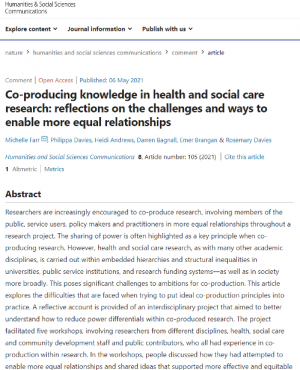Reflecting on the challenges and ways to enable more equal relationships in co-produced research
6 May 2021
Researchers are increasingly encouraged to co-produce research, and a recently published NIHR ARC West commentary article highlights some practices and resources that could help bring co-production principles into practice.
Co-production is about involving members of the public, service users, policy makers and practitioners in more equal relationships throughout a research project. How power is shared through this process is fundamental, but tricky to achieve in practice. Trying to maintain all the principles of co-production within the real-world of structural inequities and uneven distribution of resources is a constant challenge.
This project involved facilitating a series of five workshops involving members of the public, multi-disciplinary researchers and practitioners to explore the difficulties they faced when trying to put ideal co-production principles into practice. The team wanted to share lessons about co-production from different academic disciplines, to understand how we can ensure that research processes are more equitable, particularly for members of the public to get involved.
Co-authored with two public contributors who were involved in the project and workshops, the commentary article brings together key tips that might help when thinking about who is involved and when in a co-production project, and how to navigate challenges with respect to communication and relationships. The article uses different theoretical perspectives on power to help understand how we can facilitate more equal relationships between everyone.
Co-production is a word that gets used in many ways. This project used the INVOLVE definition which focuses on the active involvement of service users or members of the public in designing and conducting the research, as opposed to being interviewed or asked to fill in a questionnaire to provide research data. This is important, because there has been a long history of demands from service users to be more democratically involved in health and social care services and research. If we really aim to facilitate more equal relationships between everyone, this means we need to have inclusivity and equity at the heart of our work.
Dr Michelle Farr, Research Fellow at NIHR ARC West, said:
“Structural changes within academia are needed to bring co-production principles into practice, including changes to research practices, cultures and funding, in understanding of what knowledge is and how different forms of knowledge are valued.
“In our project we found it difficult to bring all co-production principles into practice, as they are highly aspirational. It is helpful to be honest about the difficulties this way of working involves, and we include reflections on this in the article. A quote from Van Gogh illustrates the approach we took in this work:
‘I am always doing what I can’t do yet in order to learn how to do it.’”
Map of resources and reflective questions
Other freely available tools from this project include:
- a map of resources to guide researchers, professionals and public contributors through the different tools and guidance that can help people co-produce research together. This includes tools to support remote co-production, on p.13-18.
- reflective questions to help everyone think about how they can work with people more equally through a process of co-produced research, including considerations to think through, when involving people remotely.
Paper
